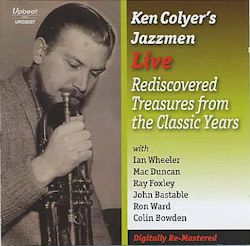1. Walkin’ with the King
2. Baby Won’t You Please Come Home
3. Trouble in Mind
4. I Can’t Give You Anything but Love
5. Bill Bailey, Won’t You Please Come Home
6. Careless Love
7. Sweet Lorraine
8. Meeting at the Building
9. Winin’ Boy Blues
10. Working Man Blues
11. One Sweet Letter from You
12. Dusty Rag
13. Joplin’s Sensation
Ken Colyer – Trumpet, guitar (track 8), vocal (tracks 1, 2, 8, 9, 11)
Ian Wheeler – Clarinet
Mac Duncan – Trombone
Ray Foxley – Piano (tracks 1-7)
Johnny Bastable – Tenor banjo
Ron Ward – String bass
Colin Bowden – Drums
Rosa Scudder – Vocal (tracks 3-6)
Recorded in the late 50’s, locations indefinite
but most likely Studio 51 and Eel Pie Island.
This latest Ken Colyer Jazzmen CD contains recordings that have never been issued previously, although most of the tunes themselves have appeared on other
Colyer albums. The configuration of the Jazzmen on this CD is what is often called the “classic” one, or what John Griffith, the owner of the tapes from
which it derived, calls “Colyer’s finest band.” Colyer is at the top of his game here, totally in command of the derby mute and of the broad vibrato that
were among his signatures. He adroitly guides the band in the direction he wants through each of the selections. Duncan and Wheeler provide superb
accompaniment and support, making for a fine front line. As the opening track Walkin’ with the King illustrates, there is always excitement from
the ensemble playing, another all-important component of the Colyer interpretations. The rest of the program is typical Colyer fare, the selections
featuring the collective improvisation that Colyer deemed essential to the New Orleans style he was after.
One problem, however, that dogged so many of Colyer’s recordings is the difficulties with tempo consistency. As seemed to have happened so often, the
“controlled acceleration,” otherwise known as “rushing,” that was associated with the band is present. More often than not, Bastable was the guilty party,
although he was not the only contributor.
Another is that the recording quality falls a bit short. While there is no certainty as to who recorded the performances, there is no doubt that it was
portable equipment run by a non-professional. The balance is off in many of the tracks—probably only one mike was used. The result is that the piano and
string bass are almost inaudible on most cuts, and the banjo is over-recorded on others. Also as might be expected, vocals suffer somewhat. All but four of
the tracks contain vocals, either by Colyer or by Rosina Scudder, a singer I had never heard of prior to this release. (According to Mike Pointon’s liner
notes, she was a diminutive person, “not much more than three feet tall,” but she did not have a voice to match.) Regrettably, much of her singing
is off-mike to one degree or another. Like hers, Colyer’s vocals are also victims of the “off-mike” syndrome.
Despite these relatively minor shortcomings, Colyer fans will surely want this release, especially those who are completists. Others less familiar with
Colyer’s work will gain an insight into what made his bands tick once they get past the recording problems mentioned. It is all there on this CD. In many
respects, then, this is “classic Ken Colyer.”
Bert Thompson
